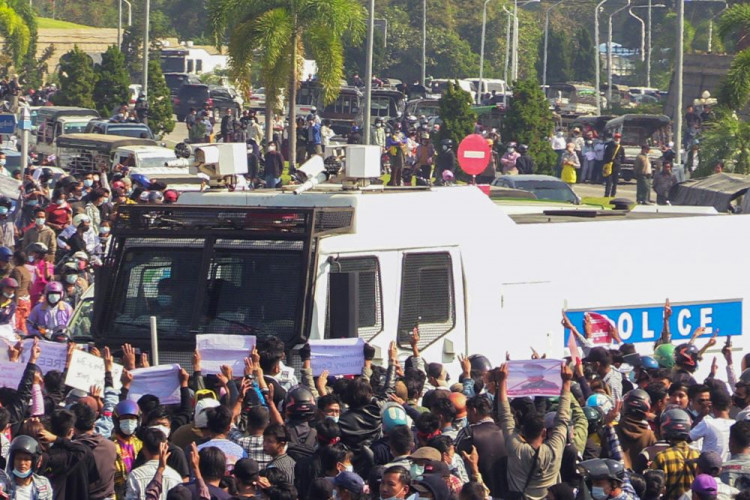Tens of thousands were protesting across Myanmar on Monday in opposition to last week's coup and the detention of elected leader Aung San Suu Kyi.
On Monday, members of the public banged pots and pans and sounded their car horns in Yangon in opposition to the military's seizing of power.
Opponents of the coup have called for more protests and work stoppages this week after tens of thousands of people joined weekend demonstrations against the removal and detention of Suu Kyi a week ago.
Crowds in Yangon, the country's biggest city, wore red and waved flags. "We don't want military dictatorship! We want democracy!" they said.
The demonstrations have largely been peaceful but shots were heard in the southeastern town of Myawaddy as police charged a group of about 200 protesters, video showed.
However, the coup is irreversible and army chief Min Aung Hlaing will seek to crush Suu Kyi's pro-democracy party and install himself as president, according to a confidential UK foreign office assessment seen by Bloomberg News. The British view says the risk is high that anticoup protests could turn bloody.
"Anticoup protests show every sign of gaining steam. On the one hand, given history, we can well expect the reaction to come," author and historian Thant Myint-U wrote on Twitter. "On the other, Myanmar society today is entirely different from 1988 and even 2007. Anything's possible."
Nevertheless, thousands from all over the city filled the streets on their way to the Sule Pagoda at the heart of the city. Armed police with riot shields set up barricades but didn't try to stop the demonstration.
Protesters have adopted a three-finger salute as a symbol of protest against the coup.
"We don't want a dictatorship for the next generation," said 21-year-old Thaw Zin. "We will not finish this revolution until we make history. We will fight to the end."
There was no comment from the junta in the capital Naypyidaw, more than 350 kilometers north of Yangon. State-run MRTV news didn't report the protests.
Protesters in Yangon on Monday and over the weekend numbered about 60,000, according to the United Nations and reported by Reuters.
Protests were reported in the second city of Mandalay and many towns and villages across the country of 53 million people.
Suu Kyi, 75, faces charges of illegally importing six walkie-talkies and is being held by police until Feb. 15. Her lawyer said he has not been allowed to see her.
Army commander Min Aung Hlaing carried out the coup on the grounds of fraud in a Nov. 8 election in which Suu Kyi's NLD won a landslide. The electoral commission has dismissed the allegations of malpractice.
"It is simple, the NLD won the 2020 election," Bo Kyi of the Assistance Association for Political Prisoners rights group said in a statement. "There is reasonable concern that the military junta will transform these peaceful demonstrations into a riot and take advantage of the instability."
More than 160 people have been arrested since the military seized power, said Thomas Andrews, the United Nations special rapporteur on Myanmar.
Pope Francis expressed "solidarity with the people" Sunday and asked Myanmar's leaders to seek "democratic" harmony.
In addition to the street protests, a campaign of civil disobedience has begun, first with doctors and joined by some teachers and other government workers.
"We request government staff from all departments not to attend work from Monday," said activist Min Ko Naing, a veteran of the demonstrations in 1988 that first brought Suu Kyi to prominence.
Internet access was partially restored Sunday as a nationwide web and social media blockade failed to curb public outrage and protests. "Partial restoration of internet connectivity confirmed in #Myanmar from 2 p.m. local time on multiple providers following information blackout," said internet monitoring service Netblocks on Twitter.
Meanwhile, Australian economic adviser to Suu Kyi, Sean Turnell, has been detained. It was the first known arrest of a foreign national in Myanmar since the coup. "I've just been detained at the moment, and perhaps charged with something, I don't know what that would be, could be anything at all of course," he told the BBC.
Australia's Foreign Minister Marise Payne said: "We were certainly supporting professor Turnell and a number of other Australians in Yangon to support them to the best of our ability and to ensure they are as safe as possible," she said.






